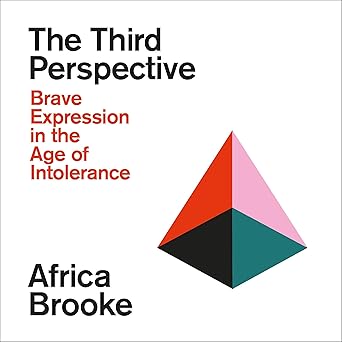
We're going to dive into a powerful guide on how to navigate difficult conversations and find common ground in a world where opinions often feel like a dividing line. The author, Africa Brooke, has spent years coaching high-profile clients on how to handle themselves in the public eye, and she's now sharing her expert advice with the rest of us.
Finding common ground in a binary world can be stressful for everyone involved, but it's essential for building trust and fruitful relationships. This book offers a framework for critical thinking and self-questioning that can help us move away from rigid thinking and into more open and honest discussions. It's about learning to share our views, listen to others, and try to find areas of agreement, even when we disagree. The author helps us to ask ourselves what's stopping us from speaking our minds, what we stand for, and what we're willing to risk. By working through these questions, we can develop a new way of communicating that's authentic, integrity-driven, and effective.
The author's strategy is based on three pillars: Awareness, Responsibility, and Expression. Awareness helps us to recognize our own biases and assumptions, Responsibility encourages us to take ownership of our thoughts and opinions, and Expression empowers us to share our views in a way that's respectful and constructive. By working through these pillars, we can develop the skills and confidence we need to navigate even the most difficult discussions. This book is not just a guide to communication - it's a roadmap to building stronger, more meaningful relationships with the people around us.
This book is a powerful guide that can help us navigate difficult conversations and find common ground in a way that feels authentic and effective. I've seen firsthand how hard it can be to connect with others when we're feeling stuck in our thinking, and how important it is to be able to share our views in a way that's respectful and constructive.
As someone who's worked with many different people over the years, I know how easy it is to get caught up in our own perspectives and forget that others may see things differently. This book offers a framework for critical thinking and self-questioning that can help us move away from rigid thinking and into more open and honest discussions. It's not just about learning to listen to others, but also about learning to see the world from their point of view. The author's strategy is all about finding that middle ground, where we can share our views and still listen to the other person. It's not always easy, and it's not always comfortable, but it's where the real growth happens.
The author's approach is based on three key pillars: Awareness, Responsibility, and Expression. By working through these pillars, we can develop the skills and confidence we need to navigate even the most difficult discussions. Awareness helps us to recognize our own biases and assumptions, Responsibility encourages us to take ownership of our thoughts and opinions, and Expression empowers us to share our views in a way that's respectful and constructive. It's a simple yet profound approach that can help us to build stronger, more meaningful relationships with the people around us. As we work through this book, I find myself thinking about all the different ways in which I've interacted with others over the years, and how this new framework can help me to approach those interactions in a more authentic and effective way.
Rating: 4.6 / 5.0
This book offers a powerful framework for navigating difficult conversations and finding common ground. The author shares her expert advice on how to handle ourselves in the public eye, emphasizing the importance of awareness, responsibility, and expression. By working through these three pillars, we can develop critical thinking, self-questioning, and effective communication skills. The book helps us to recognize our own biases, take ownership of our thoughts, and share our views in a respectful and constructive manner. It's a simple yet profound approach that can help us build stronger relationships and grow as individuals, even in the face of disagreement.